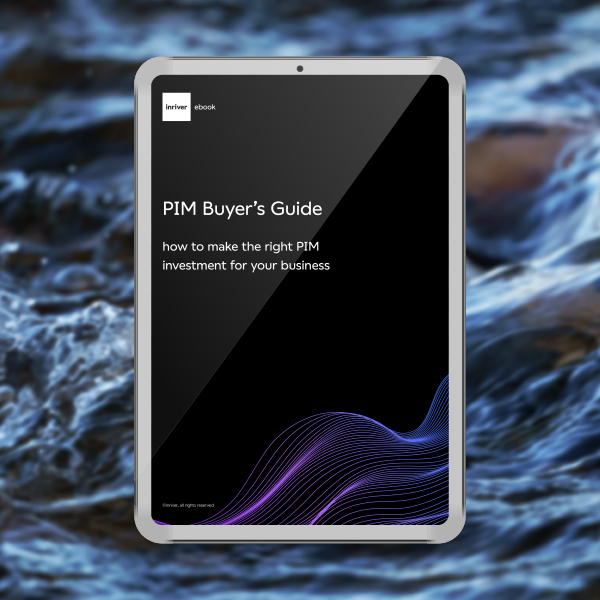What is PIM architecture?
the framework of digital commerce success
See the difference effective PIM architecture can have on the business ambitions of your brand.
Just as a well-crafted blueprint lays the foundation for a sturdy, functional building, Product Information Management (PIM) architecture serves as the essential framework for managing, enriching, and distributing product information efficiently across all channels.
As brands, manufacturers, and retailers grapple with growing data needs, a well-architectured PIM solution is essential for accurate, enriched product information across the organization.
By leveraging advanced PIM technology, you unlock the potential to not only meet but exceed customer expectations—paving the way for streamlined operations, increased sales, and a consistent omnichannel presence.
What makes up PIM architecture?
At the heart of PIM architecture are several core components that work in concert to enhance the flow and integrity of product information, making it a powerhouse for digital commerce. Note these components and how they connect:
- Data modeling: The structural foundation of a PIM system, ensuring that each piece of product data has a specific place and relationship to other data for easy onboarding, access, and management.
- Data quality management: While the PIM data model orchestrates relationships between data, data quality management acts as the architecture’s quality control system and verifies that all product information is accurate, complete, and consistent.
- Workflow management: Like a building’s internal wiring, workflow management ensures that processes run smoothly and efficiently from one department to another. With advanced PIM architecture, clean, unified data flows to each team to maximize collaboration and productivity.
- Digital asset management: A repository for all digital product content, including images, videos, and documents. With well-architected digital asset management, assets are neatly organized and easily retrievable, ready to enrich product information at a moment’s notice.
- Omnichannel publishing: The mechanism that distributes enriched and verified product information across various channels—online marketplaces, e-commerce platforms, social media, and print catalogs.
Collectively, these PIM architecture components ensure that every product detail, specification, and image your customers see online accurately reflects your brand.

How does PIM fit into your IT infrastructure?
For brands, manufacturers, and retailers, the tech stack of essential software seems to grow annually. To stay agile, you might wonder: is a PIM system really necessary? And if so, where does it fit in amongst must-have infrastructure like ERP, CRM, and e-commerce platforms?
The short answer is that advanced PIM solutions are essential to stay competitive in an always-online market. Unlike the many other software solutions in your tech stack, PIM transforms all your product-related data into customer-facing product information and forms the basis for creating winning omnichannel product experiences.
Rather than contribute to a bloated tech stack, PIM technology ties it all together by creating this external-facing information needed across all channels, from ideation to final sale.
Cloud-based PIM solutions can keep up with emerging trends like AI-driven data categorization and real-time syndication, delivering regular updates to ensure your IT infrastructure stays lean, fast, and always on the cutting edge.
What challenges might businesses face with PIM?
Even the most meticulously planned building might face hurdles during construction. In the same way, while implementing a PIM system can be transformative, it can also come with challenges like:
- Data migration: The end goal of PIM architecture is a single source of product data truth. But getting there often involves data migration from multiple legacy systems, which may themselves contain inconsistencies or misinformation.
- System compatibility: Application of PIM architecture into existing platforms can present a heavy technical lift. Failing to verify system compatibility before implementation can cause headaches down the road.
To overcome common implementation challenges, facilitate a data audit at the beginning of the process. An advanced PIM system can help with the audit during implementation. This audit will allow you and your implementation partner to pave a smarter path to success. You may also wish to initiate a technical systems check to gain the full scope of any necessary overhauls or integrations.

inriver: Your PIM blueprint for business success
Just as the greatest success comes from the most well-laid plans, a PIM solution with comprehensive architecture sets your business up to succeed in an omnichannel world. Understanding PIM architecture enables brands, manufacturers, and retailers to utilize the full benefits of PIM—driving better customer experiences across every touchpoint.
Inriver is the only PIM solution with a dynamically adaptable data model, the key component to crafting PIM architecture for your business. Reach out today for a guided demo to see how inriver can transform your data management into a tool for business success.
want to see the inriver PIM in action?
Schedule a personalized, guided demo with an inriver expert today to see how the inriver PIM can get more value from your product information.
you may also like…
frequently asked questions
can PIM architecture support omnichannel strategies?
Yes, a PIM solution with well-architected data directly supports omnichannel strategies by guiding the flow of enriched data from the PIM to all internal and external touchpoints. In turn, all product information is accurate, updated, and actionable across all channels.
what type of data is stored in the PIM system?
A PIM system stores a wide range of product-related data that is essential for marketing, selling, and managing products effectively. This includes:
- Basic identifiers such as SKUs and UPCs
- Product specs and descriptions
- Enriched digital assets
- Supplier and manufacturer data
- Regulatory and sustainability data
In essence, a PIM system can store any data that pertains to a product’s lifecycle, from inception through sale to post-purchase support.
can the PIM system easily connect with my internal platforms?
Absolutely. Modern PIM systems are built with integration in mind, designed to easily connect with a variety of internal platforms such as:
- ERP (Enterprise Resource Planning)
- CRM (Customer Relationship Management)
- CMS (Content Management Systems)
- E-commerce platforms
Through APIs and pre-built connectors, PIM systems can synchronize data across your IT infrastructure, ensuring that up-to-date product information reaches every part of your organization.
